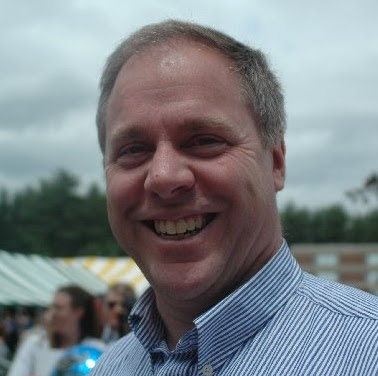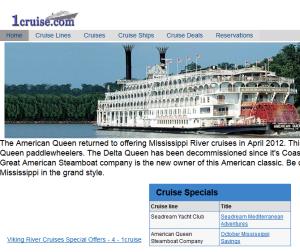 Robert Longley spent 8 years as an Air Force Intelligence Officer. He has gone on to start the First Online Cruise Travel Agency and other entrepreneurial initiatives. Robert has spent most of his career in IT project management and specializes in case management systems for social services.
Robert Longley spent 8 years as an Air Force Intelligence Officer. He has gone on to start the First Online Cruise Travel Agency and other entrepreneurial initiatives. Robert has spent most of his career in IT project management and specializes in case management systems for social services.
HSLD: Besides the little background that weíve given about you, could you tell us a little more about yourself?
Robert: I grew up on a farm, went to college and did the ROTC thing. I thought I knew exactly what I was going to do going into the military. I had plans to be a base architect and is often the case, the military had other plans for me.
I thought I was going to be stationed at Peace Air Force Base and got my orders to go to Texas instead. The military sent me to Texas to become an intelligence officer which I thought was interesting.
That was the start of a rapidly changing career. I got my training, showed up to my first base and was told I was going to be doing intelligence collection management instead. This has been the theme in my career ever since.
I walked into a position wherein there was a lot of freedom as a lot of information was classified and I had access. It was a great way to start a career.
HSLD: Letís start with your success quote. What is it?
Robert: One of my favorite quotes is something called me paradox. It goes:
If youíre looking for something but you donít know what it is, only once youíve found it will you know what you were looking for
That quote really speaks to having direction. If I look back into my 20-year old self and see the steps I had to take in order to get where I am now, it would not have made a lot of sense but just knowing that each step that I took, took me in this direction.
You have to have at least an idea of where youíre going even if you donít know where youíll end up.
Looking back it all makes sense. Without a plan none of it would have happened.
Click here to listen to this podcast on Stitcher.
Click here to listen to this podcast on iTunes.
HSLD: Letís focus on your military experience. Tell us a story of your most pivotal moment in the US army and share with us some of the lessons you learned.
Robert: The most pivotal moment in my career was the month prior to the start of the gulf war. Things stopped being bureaucratic and a real sense of teamwork came about.
I worked on a lot of systems in the military and one particular system in design at that time, we were expected to get our version of this system in probably 1993 or 1994 which was a couple of years after the gulf war.
I got a call one day from someone in Washington saying that they were bringing down my terminal that very Wednesday. I asked them what they were talking about because I thought it had not even tested yet.
That was just one of the many things that was happening at that time. They literally faxed us the instructions of how they thought this thing was going to work because it had not even been tested with our equipment.
The guy showed up on Wednesday and basically brought this specialized computer. This was back in the day before Windows so if you had an application it came in the form of a computer.
We got this thing set up and ran a bunch of cable and tied it in to the bases and we played around with it for several hours and absolutely nothing happened.
We slowly turned off all of the security settings and at 7:00 at night thereís a blip on my screen and a message came through from one of the ships announcing that they had just launched on Iraq and it was a crazy moment because I was the first person to see that in our unit.
HSLD: Letís focus on your transition out and the failures, challenges and lessons you got from it.
 Robert: A lot of stuff was happening at once. After the gulf war I finished with that assignment and moved on. I was sent to Washington to get involved with a lot of special projects and one of them was to transition all of our information into this new format called HTML.
Robert: A lot of stuff was happening at once. After the gulf war I finished with that assignment and moved on. I was sent to Washington to get involved with a lot of special projects and one of them was to transition all of our information into this new format called HTML.
I ended up building one of the first 25 or so websites that actually existed.
After the gulf war or any war for that matter they typically do rifts- basically saying that youíre done in the military.
Seven out of ten of us guys got the notice but I survived that round. I also survived the second round years after. The third time came around and I decided that I had had enough of it.
I took my newly found internet skills and started building sites after I moved back to Connecticut.
HSLD: What would you say was that one thing that you did when you transitioned out that really got you going in the civilian world?
Robert: Being an officer in the air force is probably a very different experience from the rest of the military. Itís much more corporate and not much different from the corporate world.
I guess I didnít view the transition as that different. I didnít make a jump to a corporation but I started a venture by myself.
Also I did many things at once and didnít just stick to one thing and kept moving forward.
HSLD: What was your AHA moment?
Robert: About 12 years ago we found out that one of my kids was being molested. I went through the whole process of years in court and all that.
In going through the process with the organizations that help families, we meet this woman who takes out a 3 x 5 notecard to start writing our information.
I said ďyouíve got to be kidding. This is the 2000s and you donít have a computer?Ē. She said no.
Thatís what got me the idea to build software. I took the reservation system that I had designed to build my wifeís travel agency and turned it into a case management system for child sexual assault.
It was used for several years by all of the child agencies in Connecticut until it was replaced by a national system. That model has been used for different things- such as finding a missing person in New York, victim services in Arizona and many others.
Iím getting to the point where Iím preparing some SAS communication systems and it all really started with that moment.
HSLD: Whatís the one thing that youíre most fired up about today?
Robert: Iíve gotten to a point with the many things that Iím doing that Iím starting to systematize more. Itís exciting because I have always done so many things at once but now Iím kind of learning focus.
Robertís Lighting Round Answers
†
- What is the most difficult adjustment you had to make to the civilian world? It wasnít really me but my wife. We had a new baby and all she knew of our life was the military. When I left after 8 years, it pulled the rug out from under her.
- What is the best business advice that you can pass along to people that are making their transition now? Try to plan in advance. If you know youíre going to get out try to see what you can do in advance.
- What is one of your habits that you believe contribute to your success? I would say my ability to adapt to change.
- If you can recommend one book what would it be? The Man Who Tapped The Secrets Of The Universe by Glenn Clark.
- Whatís the best way that we can find you? Robertblongley@gmail.com and intoaction.com
†
If youíre looking to get out, start planning now and start looking for resources on the internet ūüôā
†
†
